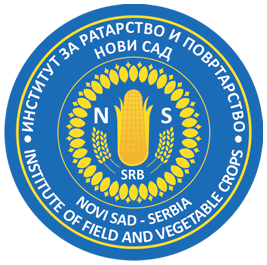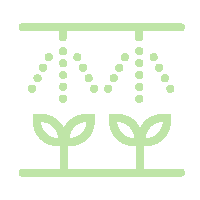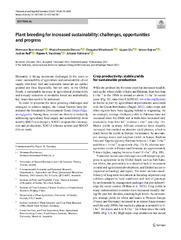Plant breeding for increased sustainability: challenges, opportunities and progress
| dc.creator | Buerstmayr, Hermann | |
| dc.creator | Dreccer, Maria Fernanda | |
| dc.creator | Miladinović, Dragana | |
| dc.creator | Qiu, Lijuan | |
| dc.creator | Rajcan, Istvan | |
| dc.creator | Reif, Jochen | |
| dc.creator | Varshney, Rajeev K. | |
| dc.creator | Vollmann, Johann | |
| dc.date.accessioned | 2023-11-27T22:32:14Z | |
| dc.date.available | 2023-11-27T22:32:14Z | |
| dc.date.issued | 2022 | |
| dc.identifier.issn | 0040-5752 | |
| dc.identifier.uri | http://fiver.ifvcns.rs/handle/123456789/4052 | |
| dc.description.abstract | Humanity is facing enormous challenges in the years to come: sustainability of agriculture and sustainability of our supply with food, feed and renewable materials are neither granted nor free. Especially, but not only, in the Global South, a sustainable increase in agricultural productivity and a steady reduction of avoidable losses are undoubtedly key issues that need to be addressed. In order to pinpoint the most pressing challenges and strategies to achieve targets, the United Nations have formulated the Sustainable Development Goals (https://sdgs.un.org/goals). Among these, several are directly or indirectly addressing agriculture, food supply and sustainability, most notably SDG2 (zero hunger), SDG12 (responsible consumption and production), SDG13 (climate action) and SDG15 (life on land). | sr |
| dc.language.iso | en | sr |
| dc.publisher | Springer | sr |
| dc.rights | openAccess | sr |
| dc.source | Theoretical and Applied Genetics | sr |
| dc.subject | plant breeding | sr |
| dc.subject | sustainability | sr |
| dc.subject | challenges | sr |
| dc.subject | opportunities | sr |
| dc.subject | progress | sr |
| dc.title | Plant breeding for increased sustainability: challenges, opportunities and progress | sr |
| dc.type | article | sr |
| dc.rights.license | ARR | sr |
| dc.citation.epage | 3683 | |
| dc.citation.rank | aM21 | |
| dc.citation.spage | 3679 | |
| dc.citation.volume | 135 | |
| dc.identifier.doi | 10.1007/s00122-022-04238-1 | |
| dc.identifier.fulltext | http://fiver.ifvcns.rs/bitstream/id/9821/bitstream_9821.pdf | |
| dc.identifier.scopus | 2-s2.0-85141680031 | |
| dc.type.version | publishedVersion | sr |


